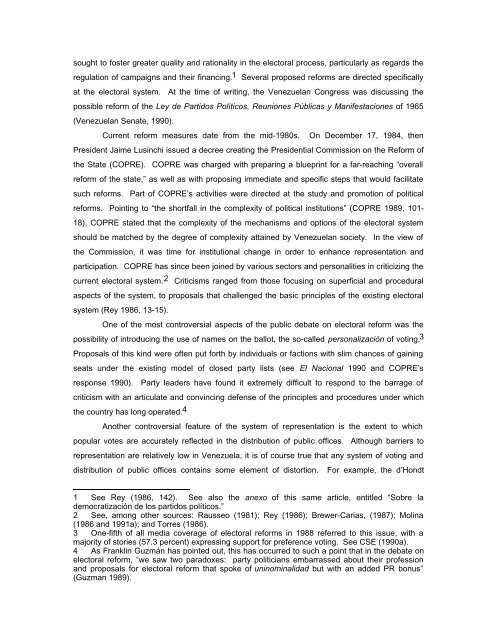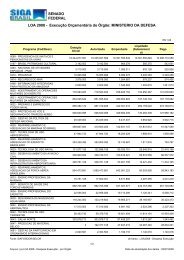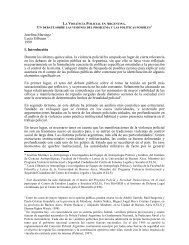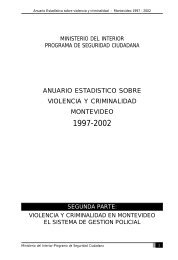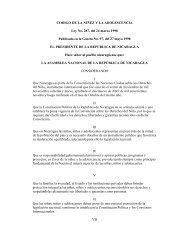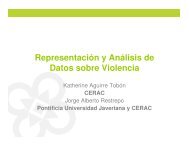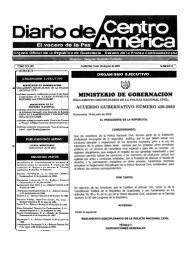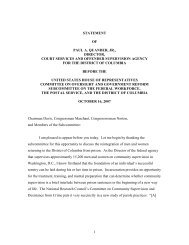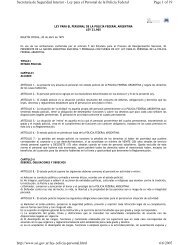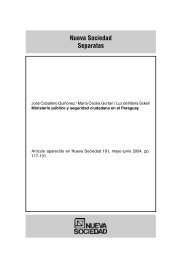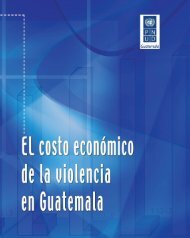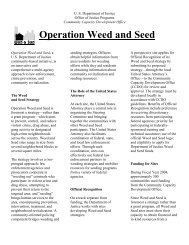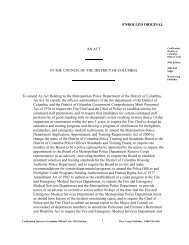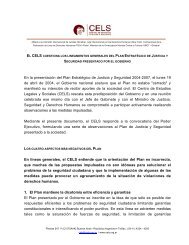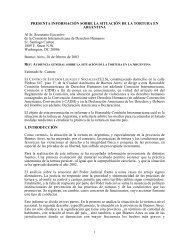Venezuela: The Life and Times of the Party System - Political ...
Venezuela: The Life and Times of the Party System - Political ...
Venezuela: The Life and Times of the Party System - Political ...
You also want an ePaper? Increase the reach of your titles
YUMPU automatically turns print PDFs into web optimized ePapers that Google loves.
sought to foster greater quality <strong>and</strong> rationality in <strong>the</strong> electoral process, particularly as regards <strong>the</strong><br />
regulation <strong>of</strong> campaigns <strong>and</strong> <strong>the</strong>ir financing. 1 Several proposed reforms are directed specifically<br />
at <strong>the</strong> electoral system. At <strong>the</strong> time <strong>of</strong> writing, <strong>the</strong> <strong>Venezuela</strong>n Congress was discussing <strong>the</strong><br />
possible reform <strong>of</strong> <strong>the</strong> Ley de Partidos Políticos, Reuniones Públicas y Manifestaciones <strong>of</strong> 1965<br />
(<strong>Venezuela</strong>n Senate, 1990).<br />
Current reform measures date from <strong>the</strong> mid-1980s. On December 17, 1984, <strong>the</strong>n<br />
President Jaime Lusinchi issued a decree creating <strong>the</strong> Presidential Commission on <strong>the</strong> Reform <strong>of</strong><br />
<strong>the</strong> State (COPRE). COPRE was charged with preparing a blueprint for a far-reaching “overall<br />
reform <strong>of</strong> <strong>the</strong> state,” as well as with proposing immediate <strong>and</strong> specific steps that would facilitate<br />
such reforms. Part <strong>of</strong> COPRE’s activities were directed at <strong>the</strong> study <strong>and</strong> promotion <strong>of</strong> political<br />
reforms. Pointing to “<strong>the</strong> shortfall in <strong>the</strong> complexity <strong>of</strong> political institutions” (COPRE 1989, 101-<br />
18), COPRE stated that <strong>the</strong> complexity <strong>of</strong> <strong>the</strong> mechanisms <strong>and</strong> options <strong>of</strong> <strong>the</strong> electoral system<br />
should be matched by <strong>the</strong> degree <strong>of</strong> complexity attained by <strong>Venezuela</strong>n society. In <strong>the</strong> view <strong>of</strong><br />
<strong>the</strong> Commission, it was time for institutional change in order to enhance representation <strong>and</strong><br />
participation. COPRE has since been joined by various sectors <strong>and</strong> personalities in criticizing <strong>the</strong><br />
current electoral system. 2 Criticisms ranged from those focusing on superficial <strong>and</strong> procedural<br />
aspects <strong>of</strong> <strong>the</strong> system, to proposals that challenged <strong>the</strong> basic principles <strong>of</strong> <strong>the</strong> existing electoral<br />
system (Rey 1986, 13-15).<br />
One <strong>of</strong> <strong>the</strong> most controversial aspects <strong>of</strong> <strong>the</strong> public debate on electoral reform was <strong>the</strong><br />
possibility <strong>of</strong> introducing <strong>the</strong> use <strong>of</strong> names on <strong>the</strong> ballot, <strong>the</strong> so-called personalización <strong>of</strong> voting. 3<br />
Proposals <strong>of</strong> this kind were <strong>of</strong>ten put forth by individuals or factions with slim chances <strong>of</strong> gaining<br />
seats under <strong>the</strong> existing model <strong>of</strong> closed party lists (see El Nacional 1990 <strong>and</strong> COPRE’s<br />
response 1990). <strong>Party</strong> leaders have found it extremely difficult to respond to <strong>the</strong> barrage <strong>of</strong><br />
criticism with an articulate <strong>and</strong> convincing defense <strong>of</strong> <strong>the</strong> principles <strong>and</strong> procedures under which<br />
<strong>the</strong> country has long operated. 4<br />
Ano<strong>the</strong>r controversial feature <strong>of</strong> <strong>the</strong> system <strong>of</strong> representation is <strong>the</strong> extent to which<br />
popular votes are accurately reflected in <strong>the</strong> distribution <strong>of</strong> public <strong>of</strong>fices. Although barriers to<br />
representation are relatively low in <strong>Venezuela</strong>, it is <strong>of</strong> course true that any system <strong>of</strong> voting <strong>and</strong><br />
distribution <strong>of</strong> public <strong>of</strong>fices contains some element <strong>of</strong> distortion. For example, <strong>the</strong> d’Hondt<br />
1 See Rey (1986, 142). See also <strong>the</strong> anexo <strong>of</strong> this same article, entitled “Sobre la<br />
democratización de los partidos políticos.”<br />
2 See, among o<strong>the</strong>r sources: Rausseo (1981); Rey (1986); Brewer-Carias, (1987); Molina<br />
(1986 <strong>and</strong> 1991a); <strong>and</strong> Torres (1986).<br />
3 One-fifth <strong>of</strong> all media coverage <strong>of</strong> electoral reforms in 1988 referred to this issue, with a<br />
majority <strong>of</strong> stories (57.3 percent) expressing support for preference voting. See CSE (1990a).<br />
4 As Franklin Guzmán has pointed out, this has occurred to such a point that in <strong>the</strong> debate on<br />
electoral reform, “we saw two paradoxes: party politicians embarrassed about <strong>the</strong>ir pr<strong>of</strong>ession<br />
<strong>and</strong> proposals for electoral reform that spoke <strong>of</strong> uninominalidad but with an added PR bonus”<br />
(Guzman 1989).


